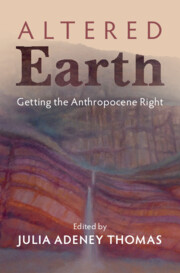Crossref Citations
This Book has been
cited by the following publications. This list is generated based on data provided by Crossref.
Simon, Zoltán Boldizsár
and
Tamm, Marek
2023.
The Fabric of Historical Time.
Bohle, Martin
2023.
Crafting Attributes of a Geological Now.
Earth Science, Systems and Society,
Vol. 3,
Issue. 1,
Thomas, Julia Adeney
2024.
The Anthropocene's stratigraphic reality and the humanities: a response to Finney and Gibbard (2023) and to Chvostek (2023).
Journal of Quaternary Science,
Vol. 39,
Issue. 1,
p.
1.
Antweiler, Christoph
2024.
Anthropology in the Anthropocene.
p.
135.
Antweiler, Christoph
2024.
Evolutionäre Sozialwissenschaften.
p.
15.
Duffy, Andrea
2024.
Weather or Not.
Agricultural History,
Vol. 98,
Issue. 3,
p.
413.
Herbert, Alexander
2024.
Protesting Destruction in Chapaevsk: Green Politics in a Late Soviet City.
Europe-Asia Studies,
Vol. 76,
Issue. 6,
p.
932.
2024.
Stockholm and the Rise of Global Environmental Governance.
p.
217.
Howe, Cymene
and
Boyer, Dominic
2024.
Sister cities for the Anthropocene.
Nature Cities,
Vol. 1,
Issue. 5,
p.
330.
Antweiler, Christoph
2024.
Anthropology in the Anthropocene.
p.
1.
Nightingale, Carl
2024.
Our Urban Planet in Theory and History.
Hétier, Renaud
and
Wallenhorst, Nathanaël
2025.
Philosophy of Education in the Anthropocene.
p.
27.
Bohle, Martin
Holzer, Boris
Sklair, Leslie
and
Will, Fabienne
2025.
The Anthropocene Working Group and the Global Debate Around a New Geological Epoch.
p.
9.
Bohle, Martin
Holzer, Boris
Sklair, Leslie
and
Will, Fabienne
2025.
The Anthropocene Working Group and the Global Debate Around a New Geological Epoch.
p.
1.
Hétier, Renaud
and
Wallenhorst, Nathanaël
2025.
Philosophy of Education in the Anthropocene.
p.
1.
Bohle, Martin
Holzer, Boris
Sklair, Leslie
and
Will, Fabienne
2025.
The Anthropocene Working Group and the Global Debate Around a New Geological Epoch.
p.
181.
Sörlin, Sverker
2025.
Planetary environing: The return of boundaries as a category in global environmental governance.
The Anthropocene Review,



